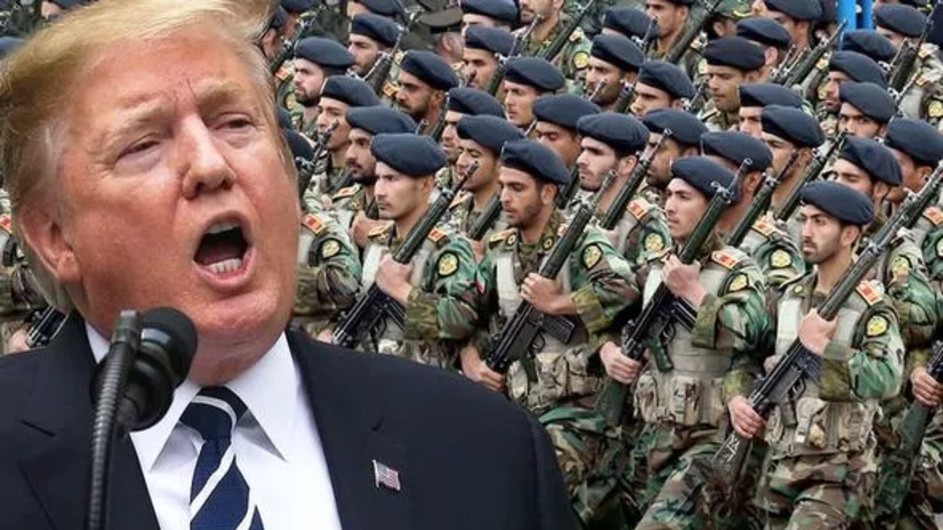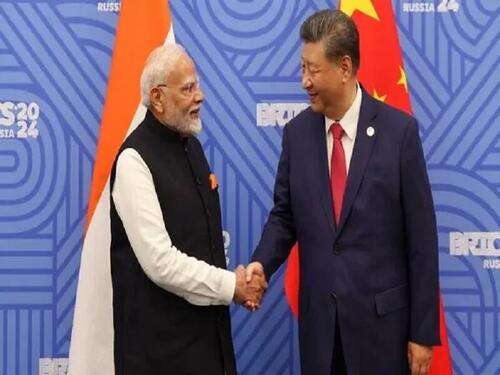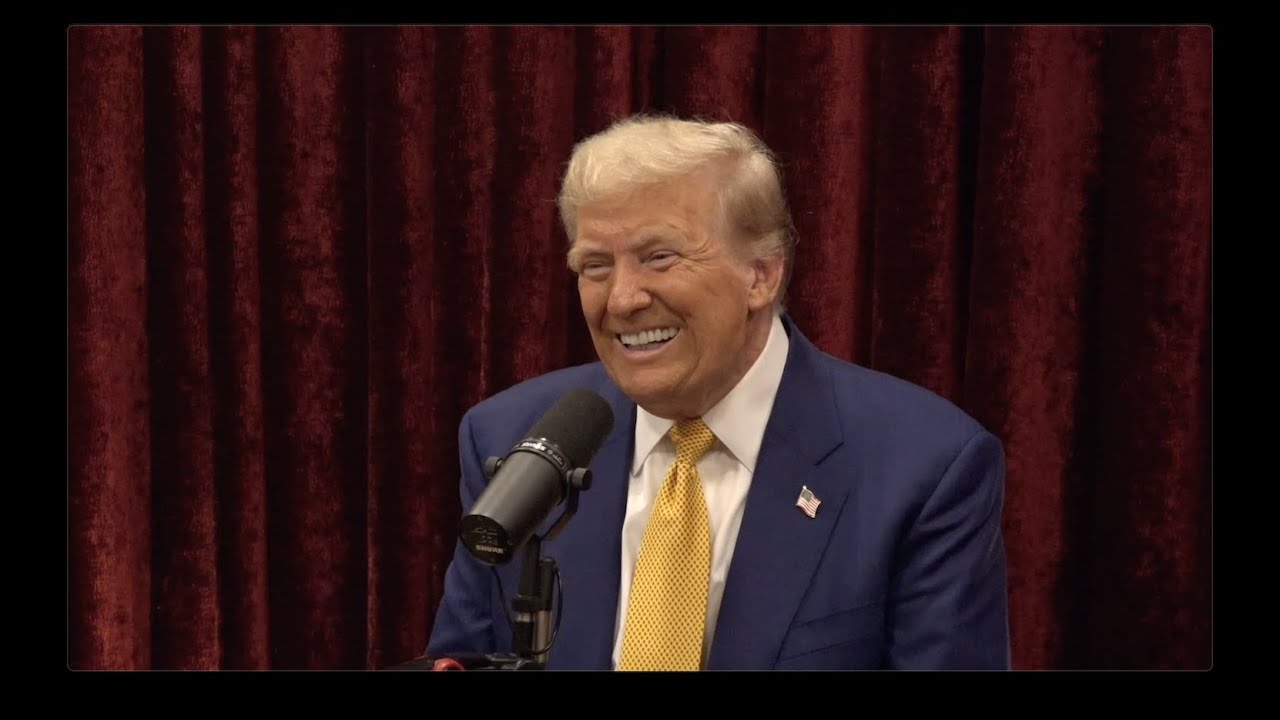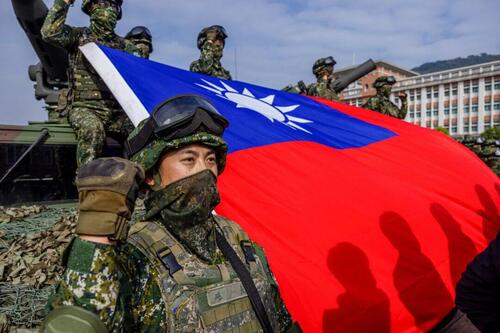The Atlantic Council Has Big Plans For A War Between The US And Iran
By Brandon Smith Globalists as an organized entity have a habit of shifting their efforts between various false-front institutions in…
The post The Atlantic Council Has Big Plans For A War Between The US And Iran appeared first on Alt-Market.us.
The US Was Inadvertently Responsible For The Sino-Indo Border De-Escalation Deal
The US Was Inadvertently Responsible For The Sino-Indo Border De-Escalation Deal
Authored by Andrew Korybko via Substack,
India announced earlier this week that it and China agreed to patrol their disputed border area in the way that it was before June 2020’s lethal Galwan River Valley clashes. This was made possible by China finally complying with India’s long-standing request, which in turn paved the way for their leaders to hold a bilateral meeting on the sidelines of this week’s BRICS Summit in Kazan. What many don’t realize, however, is that the US was inadvertently responsible for facilitating their deal.
This analysis here from early May explains how summer 2023’s scandal about an alleged Indian assassination attempt against a Delhi-designated terrorist-separatist with dual American citizenship on US soil was a turning point in their ties. The US then continued with its good cop, bad cop game against India prior to pushing Canada to escalate its related dispute with India earlier this month. Even before the latest developments, however, Indo-US ties had already noticeably soured over this issue.
India and China held multiple rounds of talks on their disputed border since 2020, but no breakthrough had occurred until Indo-US ties became characterized by distrust as a result of summer 2023’s scandal and all that followed. China realized that those two’s previous level of trust will never return, which assuaged its concerns that India is playing a leading role in the US’ containment policy. It was this shift in perceptions that then led to China reconsidering its informal policy towards their border dispute.
China had been reluctant to return to the status quo ante bellum since this was seen as a unilateral concession that could signal weakness and worsen its hand in the South China Sea. The drastic downturn in Indo-US ties, however, led to the aforesaid being perceived as a pragmatic means for managing the abovementioned concerns about India containing China in coordination with the US. The improvement of Sino-Indo ties could therefore place limits on the future improvement of Indo-US ones.
Finally complying with India’s long-standing request for resolving their post-Galwan tensions and consequently placing their partnership back on track amidst the dramatic downturn in Indo-US ties could preclude the possibility of India participating in the US’ containment scheme. No improvement in Indo-US ties would occur at the expense of Sino-US ones if that happens after this sensitive problem is finally patched up by then and India thus no longer has the same threat perception of China as before.
China and India have natural economic complementarities, and if the world’s two largest countries ever found a way to unleash their full mutual potential upon resolving their sensitive territorial issues and correspondingly restoring mutual trust, then global affairs would begin to revolve around them. That’s why the US has sought to divide-and-rule them through information warfare and its Kissingerian “triangulation” policy, but this failed after it went too far pressuring India over summer 2023’s scandal.
About that, the US never respected India as an equal partner and instead sought to subjugate it as a vassal by demanding that India comply with the West’s unilateral sanctions against Russia, which was unacceptable for both economic and principled reasons. The US also feared India’s astronomical rise as a Great Power since the start of the special operation, fueled to a large degree by discounted Russian energy, since this accelerated multipolar processes to the detriment of its unipolar hegemony.
That explains why it exploited summer 2023’s scandal to worsen their ties, meddled in this year’s earlier general elections, and even helped overthrow the Bangladeshi government a few months ago in order to pressure India into complying with these demands and then punishing it when this didn’t happen. Military and trade ties remain stable for now, but it can’t be taken for granted from India’s perspective that this will remain the case as their political ties continue to deteriorate over summer 2023’s scandal.
They can quietly manage their competition in Bangladesh and try to find a modus vivendi there, while the US’ meddling wasn’t direct nor intense enough like in other elections to seriously worsen their ties, which is why summer 2023’s scandal remains the most troublesome of their disputes. Instead of letting it subside, the US continues exacerbating it at periodic intervals, both on its own and via its Canadian proxy. This informed India that the US has malicious intentions and can never be fully trusted again.
Accordingly, India was therefore pleased that China finally decided to comply with its long-standing request for resolving their post-Galwan tensions and getting bilateral ties back on track, which showed the US that India will never become its vassal. Additionally, India also demonstrated that it’s influential enough to further accelerate multipolar processes to the detriment of the US’ unipolar hegemony as revenge for being mistreated, though its wayward partner still might not change its ways.
Even on the off chance that it does, the mutual trust that used to characterize their ties before summer 2023’s scandal will never return, thus ruling out the possibility that India will contain China in coordination with the US in the future. This is especially so after China just removed the primary irritant in their relations over the past four years that was responsible for driving the military dimension of Indo-US ties that prompted the People’s Republic to speculate that India was trying to contain it with the US.
In retrospect and provided that the incipient Sino-Indo rapprochement continues, the US’ pressure campaign against India might be seen as a game-changer due to how tremendously it’s poised to reshape the global systemic transition’s strategic dynamics. The meaningful improvement of Sino-Indo relations could lead them closer to unlocking their full mutual potential, which would revolutionize International Relations if successful and thus bring an even swifter end to the US’ unipolar hegemony.
Tyler Durden
Fri, 10/25/2024 – 23:25
Watch: Trump And Rogan Have A Wild Interview
Watch: Trump And Rogan Have A Wild Interview
Former President Donald Trump appeared on the Joe Rogan podcast Friday, where they discussed a wide range of topics for three hours.
Watch:
Highlights:
Getting rid of income taxes:
JOE ROGAN: “Did you just float out the idea of getting rid of income taxes and replacing it with tariffs? — Were you serious about that?”
DONALD TRUMP: “Sure, why not?” pic.twitter.com/VGLbUdk8j8
— America (@america) October 26, 2024
Hoaxes perpetrated against Trump:
Trump and Rogan GO OFF on the corrupt mainstream media spreading hoaxes such as the bloodbath hoax, the very fine people hoax, and the Russiagate hoax: pic.twitter.com/qZJcZsf8oM
— The Post Millennial (@TPostMillennial) October 26, 2024
Why Democrats are in favor of illegal immigration:
Donald Trump on the reason why Democrats are in favor of illegal immigration: “They hate our country, they’re stupid, or they want to buy votes. It’s one of those three.” pic.twitter.com/c0RDSLNkWW
— America (@america) October 26, 2024
Trump on bad White House hires:
🇺🇸 TRUMP: SOME OF MY ADVISORS TURNED OUT TO BE BULLIES AND IDIOTS
“It always comes back to the same answer.
The biggest mistake I made was I picked a few people I shouldn’t have picked.
Neo-cons, or bad people, or disloyal people, a guy like Kelly who’s a bit of a bully.… https://t.co/OBZTQgWXEp pic.twitter.com/X7ZQGVsqXN
— Mario Nawfal (@MarioNawfal) October 26, 2024
Keeping Iran, Hezbollah and Hamas in check:
Trump says he kept Iran, Hezbollah and Hamas in check by threatening China’s business interests in the US if they bought even one barrel of oil from Iran. pic.twitter.com/tlIl04yeMQ
— The Post Millennial (@TPostMillennial) October 26, 2024
The two discussed the horrible condition California is in thanks to Gov. Gavin Newsom:
“How about just keep your fucking house clean.”
Joe Rogan and Donald Trump slam Gavin Newsom for “cleaning up” San Francisco for Xi Jinping. pic.twitter.com/Vne8bu4KLO
— Mythinformed (@MythinformedMKE) October 26, 2024
Trump on getting shot:
Trump shows off his bullet scar to Joe Rogan: “It makes me a tougher guy.” 🤣 pic.twitter.com/7sglMnHdog
— Benny Johnson (@bennyjohnson) October 26, 2024
Trump on Musk:
Donald Trump on Elon Musk: “That guy is such a great guy… Starlink… He got it for them so fast, saved so many lives.” pic.twitter.com/N1bSbjoXPS
— America (@america) October 26, 2024
“Surreal” – On what it was like when Trump won the 1st time:
Donald Trump is a legend and a hero.
And if you don’t understand that, you are an idiot. pic.twitter.com/nHDrf2wUjY
— Viva Frei (@thevivafrei) October 26, 2024
“I want to be a whale psychiatrist” – Offshore windmills and how they affect whales:
TRUMP: “I want to be a whale psychiatrist.”
Trump discusses offshore wind mills with Joe Rogan. pic.twitter.com/8T4NpIDA3T
— Daily Caller (@DailyCaller) October 26, 2024
“You’ve said a lot of wild shit!” – Why Trump became so popular:
.@joerogan explains to Trump why he started to get so much media attention: “People were tired of someone talking in this bullsh*t, preprepared politician lingo.” pic.twitter.com/0Yh0hkeGZi
— Daily Caller (@DailyCaller) October 26, 2024
Trump on Barron:
Trump says that Barron is helping him with youth outreach.
“So I have a son—he’s very smart and tall. Barron. He knows all about you. He knows about guys I’ve never heard of…and I’ve gone up 30 points…with young people.” pic.twitter.com/sl59wHiwfm
— America 2100 (@America_2100) October 26, 2024
“Big pharma wasn’t thrilled” – Trump on pressure not to work with RFK Jr.:
Joe Rogan: “Do you have anyone that is pressuring you to not work with [RFK Jr]?”
Trump: “Yes…Big Pharma wasn’t thrilled.” pic.twitter.com/C7OPP2nivg
— America 2100 (@America_2100) October 26, 2024
Tyler Durden
Fri, 10/25/2024 – 23:06
BREAKING: Israel launches retaliatory airstrikes on military targets in Iran
Early Saturday, Israel launched airstrikes on military targets in Iran.
Lebanon Expresses Outrage After Israeli Warplanes Strike Group Of Journalists: ‘War Crime’
Lebanon Expresses Outrage After Israeli Warplanes Strike Group Of Journalists: ‘War Crime’
Lebanon has accused Israel of committing a war crime after a group of journalists in south Lebanon came under attack by Israeli warplanes. Three journalists were killed during an air raid on a hotel or guesthouse in Hasbaya, about 50km south of Beirut and near the Syrian border.
BBC is reporting that “The attack was carried out on a guesthouse in a compound in Hasbaya being used by more than a dozen journalists from at least seven media organizations – with a courtyard containing cars clearly marked with ‘press’.
The three slain journalists worked for regional broadcasters Al-Manar TV and Al Mayadeen TV, which confirmed the deaths in statements, identifying the deceased as Ghassan Najjar, Mohammad Reda, and Wissam Qassem.
While Israel did not offer immediate comment, it might rationalize or seek to justify the killings given that Al-Manar is a Hezbollah-run news network, and Al Mayadeen is seen as pro-Iran.
But Lebanon’s Information Minister Ziad Makary charged that this was an intentional assassination of journalists.
“The Israeli enemy waited for the journalists’ nighttime break to betray them in their sleep… This is an assassination, after monitoring and tracking, with prior planning and design, as there were 18 journalists there representing seven media institutions. This is a war crime,” Makary wrote on X.
Other reporters, including from MTV Lebanon were present during the attack but escaped unscathed. “All official parties were told that this house was being used as a stay-house for journalists. We coordinated with them all,” an Al-Jadeed journalist described during a subsequent live broadcast from the location.
And an MTV Lebanon reporter, Youmna Fawwaz, detailed the following:
She said ceilings had fallen in on them, and they were surrounded by rubble and dust, with the sound of fighter jets overhead.
Each news organization had their own building in the compound, she said, and the building housing the Al Mayadeen reporters was “obliterated” while Al-Manar employees were inside.
Images from the bombed-out scene indeed show cars with large English markings indicating ‘Press’…

Fawwaz further accused Israel of conducting assassinations in order to prevent the Lebanese correspondents from covering the fighting in the south. “The airstrike was carried out on purpose. Everyone knew we were there. All the cars were labelled as press and TV. There wasn’t even a warning given to us,” she said.
Since the start of the conflict after Oct.7, 2023 – dozens of journalists have died – mostly in Gaza. Israel has particularly cracked down on Al Jazeera, expelling the Qatar-based network from Israel and the West Bank.
Tyler Durden
Fri, 10/25/2024 – 18:00
UK conservative activist Tommy Robinson charged with ‘terror offense’ in London
Robinson was charged under schedule seven of the Terrorism Act 2000, police said.
Jack Posobiec tells Trump rally: The globalist elites ‘will never break the American spirit’
“We are going back to an America where families can take their kids to a drive-in under the stars and not worry about violent crime and not worry about how much the popcorn is gonna cost or worry about the oils that were used to make it.”
JACK POSOBIEC: ‘The Kamala-mentum has come to a screeching halt’
“The joy is over.”
Preparing For The Steal
Preparing For The Steal
Authored by Jeff Carlson & Hans Mahncke via Truth Over News,
Georgia, the site of massive election misinformation, questionable results, incomplete audits and a mysterious come-from-behind razor-thin win by Joe Biden in 2020, appears to be at it again. Or perhaps we should say Georgia Secretary of State Brad Raffensperger is at it again.
Kylie Jane Kremer brought the matter to our attention through a series of posts on X. As Kremer notes, “Raffensperger sent an email, in a private capacity, that went to a list of trial lawyers across Georgia soliciting $5 million by November 1st to help in his effort for a 501(c)4 called “Election Defense Fund”, asking lawyers to donate or contact him via his private gmail account & personal cell phone number.”
In the email, Raffensperger claimed that “Election deniers and conspiracy theorists have taken their anger to new levels, employing a variety of tactics including intimidation, legal challenges, and rule changes. In Georgia they have threatened, harassed, and sued election officials. And as you know, most recently the Georgia State Election Board was taken over by three individuals who have pledged to put partisanship over sworn duty.”
Raffensperger appears to be referring to (and trying to intimidate) the three Republican members of Georgia’s five -person State Election Board, Dr. Janice Johnston, Rick Jeffares and Janelle King.
Raffensperger also appears to be attempting to intimidate and silence anyone who might challenge the outcome of Georgia’s 2024 presidential election.
On September 20th, Johnston, Jeffares and King voted in favor of requiring a hand count of all ballots to ensure that the number of physical ballots equaled the machine count total at the precinct level. This new rule was opposed by Georgia state elections officials, including Raffensperger, who said it could create chaos and confusion on Election Day.
In advance of the vote by the State Election Board, Raffensperger issued a formal statement, claiming that “Activists seeking to impose last-minute changes in election procedures outside of the legislative process undermine voter confidence and burden election workers… misguided attempts by the State Election Board will delay election results and undermine chain of custody safeguards. Georgia voters reject this 11th hour chaos, and so should the unelected members of the State Election Board.”
If you find it odd that Raffensperger would refer to his three fellow Republicans as “activists” while he worked to thwart common-sense changes that would dramatically increase the security of Georgia’s 2024 election, you’re not alone.
Raffensperger was apparently so concerned that he rushed to CNN-affiliate WSB, breathlessly claiming that “the State Election Board wants to take us back in time. I guess what they want is to see elections take until 3 a.m. like in Detroit, Michigan. We don’t want to do that in Georgia. Not on my watch.”
Although the move by the three Georgia Republicans had the support of President Trump, lawsuits were immediately filed – and on October 16th a Georgia court blocked the rule changes, inexplicably declaring that they were “illegal, unconstitutional and void.”
We don’t have a copy of the email (Kremer doesn’t have the full email either) but Georgia’s GOP Chairman Josh McKoon appeared to confirm the email was real in a post on X.
McKoon stated that “This email communication by Mr. Raffensperger is a dangerous and unwarranted attack on sworn elections officials doing their duty which threatens to interfere in the conduct of the election and undermine confidence in the outcome.”
McKoon went on to write that Raffensperger “spitefully harasses and undermines the public servants who have stepped up to do the job that he so spectacularly failed to do in 2020 and solicits $5 million for a secret, dark money fund “not subject to public disclosure” to dox and threaten election officials.”
As we mentioned earlier, Kremer included screenshots of the email in her post. In those screenshots was a snapshot of the address of the website, Elections Defense Fund, that Raffensperger purportedly established for the purposes of raising donations.
We looked the Elections Defense Fund up and found the site to be sparse but the language matches what is said in the email:
“Election Defense Fund, Inc. is a 501(c) (4) dedicated to protecting this year’s election results, and standing up against those who attempt to delay certification.”
“Election Defense Fund, Inc will identify local election officials who are most likely to not certify or otherwise attempt to interfere with results; educate the public to remind election officials of their duty to follow the law and the potential consequences of not doing so; support lawsuits that seek to force election officials to uphold their legal duties, and defend election officials who are harassed, targeted, or sued for doing their lawful duties.”
The site notes that “Contributions to Election Defense Fund, Inc. are confidential and not disclosed to the public and are not deductible as charitable contributions for federal income tax purposes.” The site, which claims to be a “a non-profit 501 c(4) organization” also states that it’s “Not endorsed by any candidate or candidate committee.”
Kremer also obtained what appears to be official registration paperwork from Raffensperger’s Secretary of State office for the 501(c)4 Election Defense Fund. Included in the paperwork is a reference to Ryan Germany, general counsel for Georgia’s secretary of state’s office. Germany, who was an integral part of the Georgia election fiasco, appears to be listed as both the secretary (p.1) and the incorporator (p.3) of the Election Defense Fund.
If, as it appears to us, Raffensperger is involved in his official capacity as Secretary of State, it seems likely to us that everything surrounding the Election Defense Fund should be a matter of public record – or at least subject to FOIA requests. How Georgia’s Secretary of State could be directing a private effort to raise funds to silence other public election officials is beyond our comprehension.
This preemptive attempt to silence anyone questioning Georgia’s election results seems particularly relevant after Raffensperger recently appeared on Face the Nation and stated that voting results could be delayed for three additional days after the November 5th election.
Raffensperger said that Georgia “would be waiting for the overseas ballots that come in no later than Friday, and so those will then be the final numbers.” Raffensperger may have also unintentionally foreshadowed events when he added “And we’ll just see if that makes the difference in the total vote totals.”
Given the extraordinarily slim margin in Georgia’s 2020 presidential election, these overseas votes could prove critical. According to Raffensperger, 21,075 military and overseas Georgia ballots had been requested as of October 21st. By way of comparison, Biden’s margin of “victory” in Georgia was less than 12,000 votes.
As you may recall, Raffensperger featured prominently in the chaos and controversy surrounding the results of the 2020 election in Georgia. An election that was ultimately decided in favor of Biden – who “won” by a razor-thin margin after an unexplained delay in vote counting in the middle of the night.
And, of course, Biden’s narrow margin of victory was dwarfed by more than 350,000 ballots in Georgia that lacked any chain of custody documentation – along with another nearly 107,000 ballots that had improper chain-of-custody documentation.
But there’s also something larger at play as well. It seems that the coordination extends beyond Raffensperger and Georgia to include other Secretaries of State in crucial battleground states. Michigan’s SoS Jocelyn Benson gave up this information during an appearance on the MeidasTouch podcast that was uncovered by Kylie Kremer.
Benson was asked about her work as a “part of a group of Secretaries of State” that are coordinating across state lines. Benson’s response was eye-opening:
One of the things we saw in 2020 was that particularly in battleground states, we are all battling a common adversary, a really nationally coordinated effort to undermine the will of the people, both before, during and after election day.
We learned to semi-coordinate with each other in 2020… We would talk regularly, but there was really no way for us – the six of us in those six battleground states, Wisconsin, Pennsylvania, Michigan, Arizona, Nevada and Georgia – to constantly both compare notes and also say, OK, how are we going to respond to this nationally coordinated effort with a coordinated response?
Now we have that. We actually spent 2022 working to build that team in these six states. You’ve got strong voices now in Arizona and Nevada and Georgia, Wisconsin and Pennsylvania and in Michigan. And we’re all talking. We’re all working together. We’re all very clear-eyed about what we’re up against.
Because the battle over the future of our democracy isn’t going to be in the post-election process only. It starts now and it starts with how various court battles are playing out and we’ll see all of us getting hit with the same types of sham lawsuits that are PR campaigns masquerading as lawsuits.
So as we work together, as we talk to each other, we can develop common strategies and be much more powerful and united as a team – even across party lines – then we would be if we were just fighting these battles in our respective states by ourselves.
There we have it. A group of powerful Secretaries of State are coordinating (across state lines) in battleground states to work together in coordinated fashion. Working to push back on challenges to election certification.
Making matters worse, Benson is the same SoS who famously proclaimed “if someone were to violate the law and not certify the election at the local level, we will come for you! So any local certifier who’s thinking of skirting the law and not certifying the vote, don’t even think about it, because we’ll get you.”
Benson’s declaration is actually extraordinarily similar to the language in Raffensperger’s email and the description listed on Raffensperger’s donation website:
“Election Defense Fund, Inc will identify local election officials who are most likely to not certify or otherwise attempt to interfere with results; educate the public to remind election officials of their duty to follow the law and the potential consequences of not doing so; support lawsuits that seek to force election officials to uphold their legal duties, and defend election officials who are harassed, targeted, or sued for doing their lawful duties.”
We were fairly involved in reporting during the aftermath of Georgia’s 2020 election (articles here, here, here, here & here) and can state decisively that we don’t trust Raffensperger for a single second. As we’ve said many times, we’ve long believed that something is rotten in Georgia.
But we didn’t realize the rot was being coordinated across state lines.
Subscribe to Truth Over News here…
Tyler Durden
Fri, 10/25/2024 – 07:20
Can BRICS Deliver On Its Promises?
Can BRICS Deliver On Its Promises?
Authored by RFE/RL Staff via OilPrice.com,
-
Putin is using the BRICS summit to project strength and counter Western isolation, while also pushing for initiatives like an alternative payment system and grain exchange.
-
BRICS members are divided on their approach to the West, with some seeking to reform the current international order and others aiming to dismantle it.
-
Despite its growing economic influence, BRICS faces internal challenges and a mixed track record in achieving its goals.
As Russian President Vladimir Putin hosts leaders for the 16th annual BRICS summit, he’s determined to show the West that he still has important allies by his side after nearly three years of attempts to isolate Russia for its full-scale invasion of Ukraine.
But while Putin is getting the optics he wants, what kind of an organization is BRICS actually growing into?
Finding Perspective:
The summit in Kazan, which began on October 22 and will run until October 24, is the first meeting for the group since Egypt, Ethiopia, Iran, and the United Arab Emirates joined past members Brazil, Russia, India, China, and South Africa.
Putin is looking to use BRICS, or BRICS+ as the expanded format is sometimes termed, to signal that Russia has plenty of influential friends, despite its pariah status in the West.
The summit is intended to showcase the group’s collective economic might and also entice new countries into a coalition that Moscow and Beijing hope will help form a new world order not dominated by the West.
In Kazan, Putin is expected to push negotiations to build an alternative platform for international payments that would be immune to Western sanctions.
Russia, the world’s top wheat exporter, will also propose the creation of a BRICS grain-trading exchange as an alternative to Western markets where international prices for agricultural commodities are set.
But not all BRICS members completely align with the anti-Western stance coming from Beijing and Moscow and this divide could come out in Kazan.
The Balancing Act:
While all BRICS members may be united in the “belief that the current structures that govern the international order and the global economy are unfairly weighted toward the Western world,” Stewart Patrick, a senior fellow at the Carnegie Endowment for International Peace, told me, there is a division between China, Iran, and Russia, which want to unseat the current order, and others who want to reform it.
Many BRICS members, like Brazil and India, still work closely with the United States and other countries in the West, even as they seek to gain more global leverage.
For many of the new members, with the exception of Iran — and also for many that have applied to join recently — BRICS holds mostly economic appeal.
Members and would-be members alike are also looking for alternative sources of financing than available from the World Bank and International Monetary Fund (IMF), and are looking to gain better access to burgeoning markets that could better define the global economy in the coming decades.
Why It Matters:
Beyond the financial appeal of the bloc, many countries also view BRICS as a form of geopolitical insurance.
And that hedge is even more relevant given added unpredictability brought to the United States in recent years.
Still, the divisions within BRICS — and the bloc’s so far thin track record in delivering on its initiatives — could continue to hold it back.
China, Iran, and Russia represent a group within BRICS that are grappling to varying degrees with U.S. sanctions and fighting different types of proxy battles with the United States around the world.
Others, like Egypt, are leading recipients of U.S. military aid or like the United Arab Emirates, host U.S. military bases.
Adding to those difficulties in articulating what a shared vision for the BRICS would look like, China and India have difficult relations, while there is little warmth to be found between Arab states and Iran.
Tyler Durden
Thu, 10/24/2024 – 23:25













